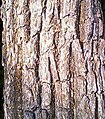Xylia xylocarpa
| Xylia xylocarpa | |
|---|---|

| |
| Scientific classification | |
| Kingdom: | Plantae |
| Clade: | Tracheophytes |
| Clade: | Angiosperms |
| Clade: | Eudicots |
| Clade: | Rosids |
| Order: | Fabales |
| Family: | Fabaceae |
| Subfamily: | Caesalpinioideae |
| Clade: | Mimosoid clade |
| Genus: | Xylia |
| Species: | X. xylocarpa
|
| Binomial name | |
| Xylia xylocarpa Roxb. Taub.
| |
| Synonyms | |
| |
Xylia xylocarpa is a species of tree in the mimosoid clade of the subfamily Caesalpinioideae of the family Fabaceae.
Description and properties[]

This perennial tree is very conspicuous in the flowering season owing to its bright yellow flowers.
Xylia xylocarpa produces hardwood, and in Vietnam it is classified as an 'ironwood' with its name referring to use in traditional cart-making. The cross-section of a trunk has a distinctive yellowish-white and thick outer layer, with a crimson-dark core of fine grain and high density (1.15 with 15% moisture content). The wood pulp may be used for making wrapping paper.
The seeds of this tree are edible.[1] This tree is considered a medicinal plant in India.[2] In Thailand its leaves are used to treat wounds in elephants.[3]
Distribution and common names[]
This tree is found in South and Southeast Asia; it is known as Pyinkado (Burmese: ပျဉ်းကတိုး) in Myanmar, Căm xe in Vietnam, Sokram (សុក្រម) in Cambodia and Jamba" or Jambe in KannadaKarnataka and Maharashtra (India). It has also been planted in certain parts of East Africa.
Xylia xylocarpa (Roxb.) Taub. var. kerrii (Craib & Hutch.) is known as (ไม้ แดง) in the Thai language. This species, naturally adapted to conditions in Thailand, is used in reforestation at certain denuded or environmentally degraded areas of the country.[4]
Gallery[]

Bark of Xylia xylocarpa

Xylia xylocarpa - flowers
References[]
- ^ P. Siddhuraju, K. Vijayakumari & K. Janardhanan Nutrient and chemical evaluation of raw seeds of Xylia xylocarpa
- ^ Encyclopedia of Indian medicinal plants
- ^ Thai Scouts celebrate 100th anniversary by planting trees
- ^ Anchalee Sri-ngernyuang, Growth of Seedlings at the Northern 60th Anniversary of Queen Sirikit Botanical Garden, Muang District, Chiang Mai Archived December 11, 2006, at the Wayback Machine(in Thai)
External links[]
- Xylia
- Flora of India (region)
- Trees of Indo-China


